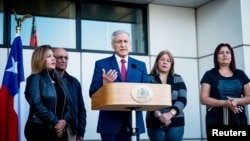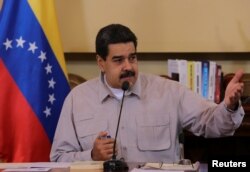Four opposition-appointed Venezuelan judges have found refuge in Chile to avoid possible prison time.
"All I can say today is that we were forced to abandon our beloved home of Venezuela, but that another nation has embraced us and will protect our freedom," judge Beatriz Ruiz told reporters at the Santiago airport Thursday.
Another judge who has been granted asylum in Chile is reportedly on the way.
They are among 33 judges appointed by the opposition-led Venezuelan National Assembly in July to challenge the supreme court. The opposition says the court is stacked in favor of what they call President Nicolas Maduro's socialist dictatorship.
The Maduro administration and the court called the judicial appointments illegal and unconstitutional and threatened all 33 judges with jail.
Five of them sought refuge in the Chilean embassy. It is unclear what has happened to the others. Some reportedly fled to Colombia and the United States.
New governors threatened with jail
Also Thursday, Maduro threatened several newly elected governors with imprisonment unless they submit to the authority of the pro-administration Constituent Assembly. Five of the 23 governors elected Sunday represent the political opposition; the rest belong to the ruling Socialist party.
Henrique Capriles, an opposition leader and former governor of Miranda state, urged the five to stand firm.
In his view, he said, any governor who takes the oath of office in support of that assembly “is betraying the confidence of the people.”
U.S. State Department spokeswoman Heather Nauert condemned Maduro’s threat to the governors as "the latest anti-democratic action." In a statement issued Thursday afternoon, she continued, "The use of this illegitimate, parallel institution to take over the country’s constitutional authorities is alarming."
The United States does not recognize the assembly, whose 545 members were chosen in a July election widely described as fraudulent. Most Latin American countries do not recognize that assembly as legitimate. The superbody is charged with rewriting the constitution.
Most of Venezuela's Latin American neighbors are also condemning Sunday's election.
Venezuela has been in turmoil for months since opposition-led protests against the Maduro government over severe food, medicine, and gasoline shortages turned violent.
Maduro blames his country's woes on the United States, accusing it of backing the opposition.





